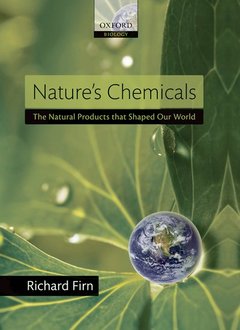Nature's Chemicals the Natural Products that shaped our world
Langue : Anglais
Auteur : Firn Richard

Natural Products (NPs) is the term used to describe the hundreds of thousands of chemical compounds or substances that are continually produced by living organisms (plants and microbes). Hundreds of millions of tons of these chemicals are generated annually, and the trade in just a few of these has dominated human economic activity for thousands of years. Indeed the current world geopolitical map has been shaped by attempts to control the supply of a few of these compounds. Every day of our lives each human spends time and money trying to procure the NPs of their choice. However, despite their overwhelming influence on human culture, they remain poorly understood. Yet a knowledge of NPs can help in our search for new drugs, further the debate about GM manipulation, help us address environmental pollution, and enable a better understanding of drug trafficking. Nature's Chemicals is the first book to describe Natural Products (NPs) in an evolutionary context, distilling the few simple principles that govern the way in which organisms (including humans) have evolved to produce, cope with, or respond to NPs. It neatly synthesizes a widely dispersed literature and provides a general picture of NPs, encompassing evolution, history, ecology, and environmental issues (along with some deeper theory relevant to biochemistry), with the goal of enabling a wider section of the scientific community to fully appreciate the crucial importance of Natural Products to human culture and future survival.
1. What are Natural Products?. 2. The Importance of NPs in Human Affairs. 3. The Main Classes of NPs - Only a Few Pathways Lead to the Majority of NPs. 4. Are NPs Different from Synthetic Chemicals?. 5. Why Do Organisms Make NPs?. 6. NPs, Chemicals and the Environment. 7. Natural Products and the Pharmaceutical Industry. 8. The Chemical Interactions Between Organisms. 9. The Evolution of Metabolism. 10. The Genetic Modification of NP Pathways - Possible Opportunities and Possible Pitfalls. Notes. Index.
Richard Firn grew up on a farm near Edinburgh, went 3 miles to university to study agriculture but found chemistry more challenging. Using a scholarship to get to Australia, by chance he began research in plant physiology which he continued in the UK and the USA. In 1973 he joined the Biology Department at the University of York and by a series of chance events he was joined by his first graduate student, Clive Jones, who enjoyed speculating about the evolutionary significance of the many diverse chemicals in plants. Not only did Clive help Richard in the laboratory, he was even called upon to help Richard build the timber house in which he still lives. Some years later, while Richard was really trying to understand how plants sense and respond to gravity and light, Clive and Richard met up again and came up with the radical idea on which this book is based.
Thanks to a liberal supply of historical notes, personal and often sharply critical opinions and an enlivening ability to broaden the context, Richard Firn's book is thus something of a page-turner and one a latter day Sherlock Holmes might conceivably have written.
Date de parution : 11-2009
Ouvrage de 264 p.
17.3x24.8 cm
© 2024 LAVOISIER S.A.S.



